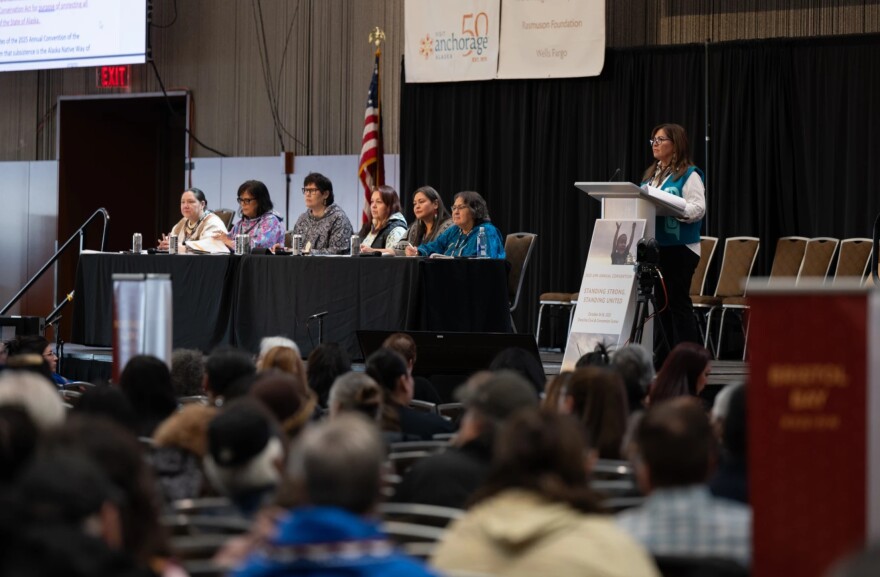Alaska Federation of Natives (AFN) delegates passed 42 resolutions on Saturday, Oct. 18, including a call for an immediate emergency declaration from President Donald Trump and more federal assistance for communities hit by the remnants of Typhoon Halong earlier this month.
The storm killed at least one woman, wiped out homes and infrastructure, and displaced more than a thousand people in the Yukon-Kuskokwim Delta. Hundreds of residents were sent to Bethel and then to emergency shelters in Anchorage over the last week.
Gov. Mike Dunleavy requested that President Trump declare a federal disaster for Western Alaska earlier this week, but that request had not been approved as of Oct. 18, the final day of the convention. Alaska's congressional delegation has also urged Trump to approve the declaration.
AFN delegates added the resolution calling for more federal help after the convention's deadline. The resolution was put forward by the Association of Village Council Presidents (AVCP), a tribal consortium that serves communities in the Yukon-Kuskokwim Delta region.
"We have a lot of support from across the state," AVCP CEO Vivian Korthuis said. "On behalf of our region, quyana to everyone."
The delegates amended the resolution to include the damage caused in the Northwest Arctic and Bering Strait regions, and called for a Western Alaska emergency response hub in Bethel.
Richard Peterson, president of the Tlingit & Haida Executive Council, also added a section urging the government and agencies to not inhibit hunting and fishing practices to replenish subsistence foods for the devastated communities.
Debate on subsistence
Dozens of other AFN resolutions touched on a wide array of topics, from health and safety to education and natural resources. Subsistence-related resolutions drew the most debate during the discussion.
AFN delegates voted to oppose possible changes to the federal Marine Mammal Protection Act, introduced earlier this year by Alaska's U.S. Rep. Nick Begich III. The resolution stated that the proposed changes would threaten protections for marine mammals, crucial for subsistence in the Arctic regions.
Another resolution affirmed subsistence as a way of life and committed to its protection and advocacy.
"This resolution touches everyone in this room and at home," Korthuis said.

However, a suggestion from the Southeast region to amend the resolution's title to include "rural and tribal subsistence" sparked a discussion about the Alaska National Interest Lands Conservation Act, or ANILCA, which gives priority to rural residents for fishing and hunting on federal lands.
Matthew Nicolai, a tribal leader from the Yukon-Kuskokwim Delta, said that when ANILCA was passed, the efforts to include Native preference failed, so the Indigenous leaders had to accept rural preference. While rural subsistence users are often Alaska Native, Nicolai said that the rural preference excludes Indigenous people who live in more urban areas.
"We're been left behind by the state, and they don't want to hear us," Nicolai said. "We've been addressing this issue for all these years.
Nicolai said it is important to include "rural" because it is the language used in ANILCA – especially in light of an ongoing attempt by the state to change the current subsistence model.
Karen Linell, the executive director of the Ahtna Intertribal Resource Commission, opposed adding the word "rural" into the title. She said AFN's main concern is Alaska Native rights, no matter where they live.
"We're looking at this so that we can amend ANILCA," Linell said. "What we're looking at is trying to address those things and get it back to what we need as Alaska Natives, and have it be a tribal preference."
Overall, there was an effort to find common ground during discussions.
Another AVCP resolution was to reaffirm commitment to addressing food insecurity in the state, and called for federal action to protect salmon.
A suggestion from the Southeast region to include support for tribal hatcheries into the resolution was met with some opposition in the room.
After a discussion, the delegates agreed on a compromise, adding a request for support for tribal hatcheries to the resolution if it's supported by the region.
"We do not want to have any division on the floor," Korthuis said.


